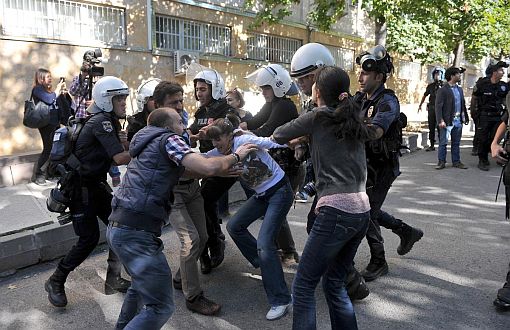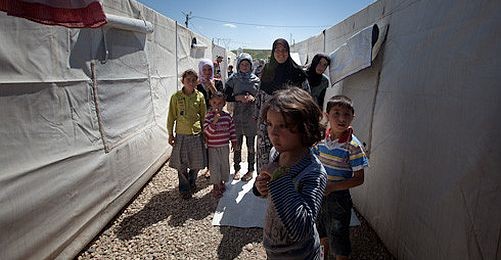
According to UN statistics, number of Syrian refugees exceeded 2 million by the end of August, with 52 percent below 17 years old.
“Chemical weapon use and intervention rumors in Syria will increase the likelihood of migration to Turkey,” said Metin Çorabatır, Center for Refuge and Migration Research (IGAM) Administrator and former spokesperson of United Nations High Commissioner for Refuges (UNHCR) Turkey.
According to statistics by Prime Ministry’s Disaster and Emergency Administration (AFAD) there are 200,000 registered and estimably 300,000 unregistered Syrian refugees in Turkey. The total number of displaced Syrians is estimated around 4,250,000.
As the number of Syrian refugees is gradually on the rise, so their problems. Moving from camps to big cities in the hope of finding a job, many Syrians are able to pay their rents with financial support. Those who can’t afford a place to stay are forced to sleep outdoors.
bianet interviewed Çorabatır on the situation of Syrian refugees in Turkey.
“While the Turkish government’s policy on Syrians is held solely through the hand of state, they also need to hear the past experiences of international organizations and NGOs,” he said.
“Refugee registration is vital”
Çorabatır said Turkey held an open border policy since the beginning of crisis with first Syrian refugees arriving to Turkey in 29 April 2011.
“Initially, the toll was around 6,000 to 10,000. After 2012, the number increased rapidly. 21 AFAD-run refugee camps house around 200,000 Syrian refugees. As the numbers increased, refugees preferred more to live in cities instead.
Several factors affect Syrian refugees’ preferences to leave camps - elongated stay periods, issues between various ethnical and religious groups.
“Syria is not homogenous country in terms of ethnicity or religion. Some groups have better relations with the government and different groups have different problems in the camps according to their social status back in Syria. When dealing with crisis, these difference must be taken into consideration.”
According to AFAD statistics, the number of registered refugees exceed 300,000. Çorabatır recommended UN’s recommendation to register every single applicant. “This is crucial for their protection and planning.”
“Judicial deficiencies”
Turkey signed the Convention relating to the Status of Refugees (CRSR) in 1951 with a reserve which included the exclusion of refugee status for those who don’t come from Europe.
Until 1994, Turkey administered its deficiency with internal regulations. After improving relations with EU, Turkey launched its first efforts for lawmaking in 2005.
In March 2013, the Turkish parliament passed a law on aliens and international protection which envisioned the establishment of Göç Yönetimi Genel Müdürlüğü - administration for migration control.
Çorabatur continued that new regulations didn’t necessarily remove the geographical reserve and such cases like Syria revealed judicial deficiencies.
“For those who migration to Turkey except from Europe, the regulations are only concerning little communities or individuals. Mass immigrations, like in Syrians case, are only regulated through the cabinet.”
“From the very beginning, the government declined to call Syrians as refugees. They called them ‘guest’ first. Then the Prime Ministry released a regulation in 2012 recognizing a ‘temporary protection status’. However, these regulations don’t envision the period of this protection status nor specific rights refugees can benefit. Everything is left to the cabinet. We don’t see any regulations related to social rights or healthcare for instance.”
“What we need to do is to facilitate refugees’ lives by immediately supporting them wherever they are. There are so many Syrians out on the streets. The government opened its doors initially, showed sensitivity. It can further make registrations to use its best capacity and give temporary working permits.”
“Possibility of intervention will increase likelihood of migration”
“The government’s policy on Syrian refugees has gained international recognition,” IGAM administrator Çorabatır told bianet. “However,” he continued, “everything is done through the government which wasn’t open to aids initially.”
Çorabatır recommended the following measures for Syrians refugees whom he believe to outgrow due to chemical weapon usage and military operation:
“New problems arise as the toll rise and stay period elongate. It is so normal. Everybody has different problems among different groups regarding ethnicity, gender, age, disability.
“Turkish Red Crescent and AFAD are experienced with natural disasters, but the refugee issue requires a different insight. The government must be open to the experience of international organizations and not only to external monetary aids.” (BK/HK/BM)
Photo credit: Çiçek Tahaoğlu / Antep Refugee Camp / April 2013 / bianet
* Click here to read the original article in Turkish.






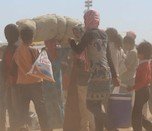
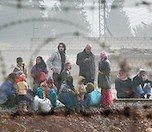
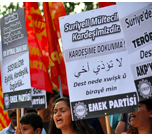
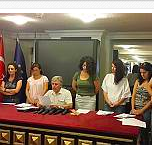
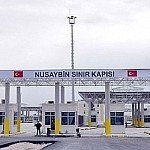
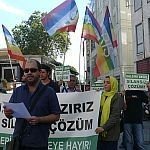
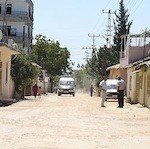
.jpg)
.jpg)
